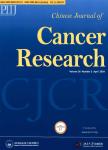Impact of jejunostomy during esophagectomy for cancer on health related quality of life
Impact of jejunostomy during esophagectomy for cancer on health related quality of life作者机构:Surgical Oncology Unit Veneto Institute of Oncology (IOV-IRCCS) Padua 35128 Italy
出 版 物:《Chinese Journal of Cancer Research》 (中国癌症研究(英文版))
年 卷 期:2014年第26卷第6期
页 面:678-684页
核心收录:
学科分类:1002[医学-临床医学] 100214[医学-肿瘤学] 10[医学]
基 金:supported by Current Research Fund from Italian Ministry of Health to Carlo Castoro grant from Berlucchi Foundation (Brescia, Italy) to Carlo Castoro
主 题:Health related quality of life(HRQL) jejunostomy esophagectomy esophageal cancer
摘 要:Background: The aim of this study was to evaluate the impact of jejunostomy during esophagectomy for cancer on postoperative health-related quality of life(HRQL).Methods: We evaluate all consecutive patients who underwent esophagectomy for cancer at the surgical oncology unit of the Veneto Institute of Oncology(IOV-IRCCS) between January 2008 and March 2014. The primary outcome was HRQL, which was assessed using nine scales of EORTC C30 and OES18 questionnaires. General linear models were estimated to evaluate mean score difference(MD) of each selected scale in patients with and without jejunostomy, adjusting for clinically relevant confounders. The secondary outcomes were morbidity, hospital stay, postoperative weight loss and postoperative albumin impairment. Results: Jejunostomy was performed in 40 on 109 patients(41.3%) who participated in quality of life investigation. A clinically and statistically significantly worse eating at admission(P=0.009) became not clinically significant at 3 months after surgery(MD =9.1). Jejunostomy was associated to clinically and statistically significantly poorer emotional function(EF) at 3 months after surgery(MD =-15.6; P=0.04). Hospital stay was longer in jejunostomy group(median, 20 vs. 17 days, P=0.02).Conclusions: In our series patients who had a jejunostomy during esophagectomy had been selected for their risk for postoperative complication. However, their postoperative outcome was actually similar compared to those without jejunostomy. Nevertheless, jejunostomy was associated to clinically and statistically significantly poorer EF at 3 months after surgery. Therefore, patient candidate to esophagectomy and feeding jejunostomy should receive additional psychological support.



